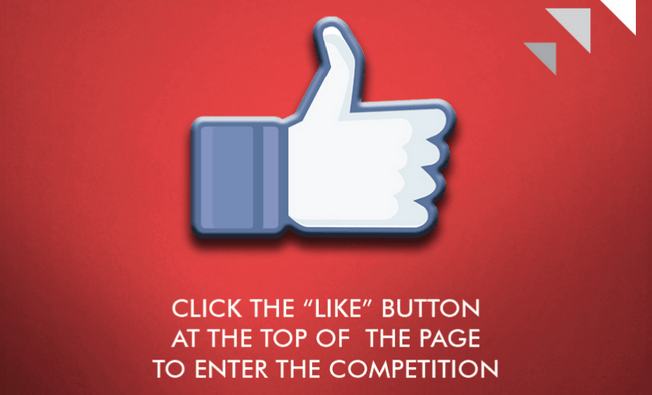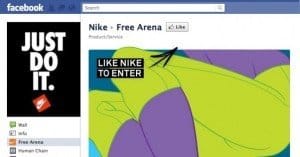 Written by ContentPowered.com
Written by ContentPowered.com
For a long time, the go-to method for growing a page was to run a contest with a like gate. A like gate was a simple wall between the user and the entry to your contest. If they wanted to enter your contest – or read your post, or view your video, or whatever else you hid behind the wall – they would need to like your page.
Facebook determined that like gates were artificial growth and that they didn’t benefit the users or the page much at all. A like gate would increase your followers, yes, but most of those followers would subsequently not care about your page. If they didn’t win, they wouldn’t come back, and they generally wouldn’t engage with your brand in any way.
Therefore, last August, Facebook decided to block like gates from their platform. The bit of their API that allowed third party app developers to create like gates was removed. App sellers like Shortstack were forced to adjust. The final removal of the like gate was performed on November 5, 2014.
So, to answer the basic question; no, you cannot still use like gating on Facebook. The functionality itself has been removed, and if you’re found trying to replicate it through a third party app, that app is liable to be removed as well.
Why Like Gates Sucked
I’ll just come out and say it; like gates kind of sucked. Sure, they were effective, but they had some major issues that you weren’t able to address. Foremost among those issues is the problem of audience focus.
See, when you gate content or contests behind likes, you get a lot of people liking your page who otherwise wouldn’t.
From a user’s perspective, here’s a statistical tidbit; without Facebook’s algorithm, the average user would see around 1,500 posts per day. Facebook cuts that down to closer to 300. This is a good thing; after all, if you spend 5 seconds looking at a post on average, seeing 1,500 posts would eat up two full hours per day.
Facebook’s algorithm uses a number of signals to determine which posts to show. One of those signals, for posts from pages, is whether or not you’ve liked that page. If you’re liking it because of a contest or a like gate, that signal becomes much less valuable. Facebook can no longer say “they like this page, therefore they want to see more from this page.”
From a business perspective, this means your likes are devalued. It also means your audience is full of people who don’t necessarily care about what you have to say. They liked your page for a contest, and they never removed their like because why would they care? They don’t see your posts anyways.
Then you have the analytical perspective. When you’re looking into your Facebook Insights, you’re seeing the aggregated data of your followers. If you’ve diluted your followers with a like gate, you have a bunch of data that’s skewing your results. If it were weighted, it would be useful to know, but it’s not. You just have to deal with diluted, skewed results.
The simplest example is the iPad giveaway example. You like gate a tablet giveaway and a bunch of people who don’t care about your brand will come in to like your page for a shot at the tech. Later, you want to run an ad targeted at a lookalike audience similar to your own, and it turns out to be largely ineffective. Why? Your targeting includes the interests of deal-seekers and tablet-wanters, not business-followers.
Effects of the Like Gate Ban
Like gates are just one of several methods of page growth and contest running that have been restricted or banned in recent years. Another is the non-app contest. Technically, you can still post a photo explaining a contest and requiring a like to enter. It’s against Facebook’s rules, but it’s difficult to enforce. Facebook can take down the contest if they notice it, of course.
You can also ask for likes as a supplement to whatever else you’re doing. A contest that requires an email opt-in works fine, and you can add “please like and share this contest!” to the end of the description with no issues.
The most widespread effect of the like gate ban, however, is the shift to other action gates. Facebook just removed the ability to require a like in exchange for something. Other actions can still be required.
Action Gating Ins and Outs
Functionally, an action gate is identical to a like gate. It works in exactly the same way, only instead of requiring a page like, it requires some other action. Otherwise, your campaigns work the same way. Ideally, the action you require is even more valuable to you than an unrelated like.
What can you use as an action for an action gate?
- Requiring an email opt-in to either your normal mailing list or a high-pressure introductory mailing list.
- Require a visit to a particular landing page, where you offer a valuable free item or offer.
- Reward current fans with special offers. A like gate is primarily beneficial in getting new fans; it does nothing for existing fans.
- Require a form submission, which can get any information you choose to ask for. This might include a basic name and email, or it might require a photo upload or a survey completion.
- Require submission of location data, so you get an idea of the geographic locations of your best users or the general location distribution of your users.
By using a gate like this, you’re gathering data to supplement what you already know about your users. You’re also getting data you can’t get otherwise, and you’re building an email list. Specialized email lists like this can allow you to build and nurture leads you can’t get through organic SEO or through social media marketing any other way.
The like gate ban requires some adjustments, but it’s an overall good change. You just need to get used to it and start using more beneficial actions as gates. While you’re at it, take the time to clean up your existing fans; your reach and engagement will benefit for it.


